- Home
- Mark Chadbourn
The Scar-Crow Men Page 2
The Scar-Crow Men Read online
Page 2
‘Tom? Thank you for coming, but there is now a need for urgency,’ the spy says.
Tom rises, stretching. He is taller than Marlowe, his eyes as grey as the winter sky, his hair blond, falling over his ears and to the nape of his neck. ‘I thought you would not come. What is your wish? The horse?’ he asks sleepily. He doesn’t notice the playwright’s dishevelled state.
‘That is for you, to get as far away from here as you can, and quickly.’ Marlowe looks on his young friend with affection, and a rising sadness, and he tries to keep the edge of fear out of his voice.
A howl echoes only a few streets away. The playwright cannot be sure if it was made by a beast or something that had the shape of a man. The Enemy can never be considered men, he thinks with a pang of bitterness. They have no compassion, no joy or love.
From the sack at his side, Marlowe pulls a thick sheaf of papers, tied with string and sealed with red wax. ‘Tom, listen to me. You must deliver this to my good friend Will Swyfte.’
‘England’s greatest spy?’
Marlowe smiles wryly. ‘Yes, that is indeed how he is known. But first, and quickly, I must write a note to accompany the work.’ He retrieves his quill and the pot of ink.
A troubled thought distracts him and he peers deep into Tom’s face, searching for familiar signs, knowing it is not enough. Then he puts one hand at the back of the young man’s neck and pulls him into a deep kiss. When he breaks away, he stares into Tom’s eyes; it is still not enough, but he has to hope.
‘What is wrong?’ Tom asks. ‘You are not yourself.’
Marlowe laughs at that.
Hearing his pursuers closing in upon their position, his hand trembles as he grips the quill. Too much is at stake, and he dare not write plainly. But too obscure and Will will not understand his warning. In the end, he can only trust in his friend’s intellect.
I fear this may be our last communication, my dear, trusted friend. The truth lies within. But seek the source of the lies without, he scrawls. Trust no one. He underlines this last.
Quickly, he folds the letter and slides it under the string before handing the complete bundle to Tom. By this time, the young man is alarmed by his friend’s actions. He senses their finality.
‘You will come with me?’ Tom asks. ‘My horse will carry two a short distance.’
‘There is nothing I would like more than to ride away with you, good Tom, and recapture those honeyed moments that made me so happy. But I fear it would mean your death. Now, be away, and fast.’ Marlowe hears the faintest tremor in his voice, but he hides it quickly, seals it with a smile.
He kisses Tom again, and turns to the boats so his young friend will not linger. He allows himself one quick glance back when he hears the hoofbeats drawing away, and a moment of sadness too, and then he scrabbles to free the mooring rope of the nearest waterman’s vessel.
Whispers roll along the river bank. Shadows emerge from an alley.
Lurching into the cold shallows, Marlowe feels the mud sucking at his shoes as he launches the boat into the current and drags himself on board. Loud splashing erupts behind him, but the current takes Marlowe away just quickly enough. Shadows flit along the water’s edge, keeping pace.
Ahead, the first gleam of dawn lights the horizon. The playwright looks to the bank and sees the grey forms melt back into the darkened streets.
Marlowe feels no relief. He lies back in the boat, letting the current take him where it will. This life is already over for him, he knows that. There is no escape.
Somewhere a killer lurks in plain sight, with a plan that threatens to engulf England in a rising tide of darkness. He listens to the water sloughing past the boat and hears in it the whispers that have haunted him since he made the first shocking discovery. Two words repeated in a rhythmic chant.
The end, the end.
The end.
CHAPTER ONE
THE MAN, DANGEROUS AND CONTROLLED, WAS MOVING THROUGH what felt like a dream, with devils and wolves, cats and dragons, dolls and jesters on every side. Fantastical faces peered at him from the growing shadows, gloved hands rising to mouths in surprise or intrigue or desire.
An excited chatter of anticipation buzzed through the upper gallery of the Rose Theatre that evening. Amid the heady atmosphere of timber, fresh plaster, perfume and sweat, the masked guests parted to allow the man through, their whispered comments following wherever he went: ‘Spy … spy … England’s greatest spy.’
The evening’s entertainment was yet to begin, but the Rose was already full. The carriages and horses had been arriving in a steady stream under the late afternoon sun that cast Bankside’s green fields and dusty roads in a warm, golden haze. The women had alighted, their flat-fronted bodices and divided overskirts in popinjay blue, or sunset orange, or lusty-gallant red, the celebratory colours sending a message of defiance in dark times. The men wore quilted doublets and flamboyant white ruffs, peasecod bellies, jerkins in cloth of silver and half-compass cloaks. Their colours were more muted, greens and blacks and browns, but the sumptuous velvet and silk embroidered with gleaming gold spoke of that same defiance. The court of Queen Elizabeth, in all its glory, would not be bowed.
The spy, Will Swyfte, was a storm cloud amid the summery festivities, unmasked, dressed all in black, quilted doublet embroidered with silver, a jerkin of fine Spanish leather and a cloak. His black hair reached to the nape of his neck, his moustache and chin-hair trimmed that very day. His eyes too appeared black. He quietly cursed the ornate masks that hid the faces of the good men and women of England as they hung over the wooden rails of the upper galleries. He couldn’t see the eyes with any clarity, and certainly couldn’t identify any threat that might lurk there. And threat there was aplenty, all around London.
Underneath the musk of the crowd, the man caught the fragrant whiff of the numerous concoctions of herbs carried to ward off the terrible death. It was a pleasant change from the sickeningly sweet stink of rot that hung over the city like a permanent autumn fog.
Pausing at the rail, the spy peered down the well of the theatre to the yard in front of the stage. The audience was lit by the dying rays of the sun falling through the central, open area of the thatched roof. The black-garbed man studied the red-brick and timber frame of the many-sided theatre, noting the best vantage points, the escape routes, the places where a life could be taken without drawing too much attention. Even in that crowded, confined space throbbing with noise, death could wait patiently for an opportunity.
‘Still no sign of Master Marlowe.’ It was Nathaniel Colt, the spy’s assistant, also unmasked. Eyes bright and inquisitive, he was smaller and younger than his master, slim and wiry, with a thin, tufty beard and moustache that made him appear younger still. ‘I would have thought he’d rather lose his writing hand than miss his own first night.’
‘Kit is a mercurial soul. He very rarely takes the path one would expect. Though I have not seen him for several days now, I have never known him to miss the opportunity for applause.’
Or not to pass on the vital secrets he promised three days ago, Will thought. The playwright’s hastily scrawled message had implied news of great importance, and a great threat too.
‘Why pass on information here?’ Nathaniel pressed. ‘Why tonight? What could be so important that it could not be conveyed within the safe walls of one of the palaces, or at his own residence, or in one of the many vile and disgusting establishments you and Master Marlowe enjoy?’
The older man had already considered all those questions. ‘I will ask Kit when he arrives. In the meantime, Nat, enjoy this fine entertainment that he and Master Henslowe have provided for us.’
With a shrug, the assistant returned his attention to the stage. ‘There is still some novelty to be found in these theatres, I suppose,’ he muttered. ‘When Master Henslowe built the Rose six years ago, I doubted his good sense. The Bankside inn-yards had always provided a serviceable venue for plays.’
‘Master Henslowe is
sharp as a pin when it comes to matters of gold.’ Will leaned on the rail, continuing to search the audience for any sign of danger: a hand raised too fast here, a man skulking away from his companions there. He knew his instincts were rarely wrong. He could feel some unseen threat lurking in the theatre. But where? He turned again to Nat. ‘He bought this land for a song, here on the marshy river borders. And the theatre is close to the many earthy attractions of Europe’s greatest city, the brothels and the bear-baiting arenas, the inns and gaming dens. There is always an audience to hand.’
‘Then he must be doubly pleased that Master Marlowe insisted his first night be held here, for an audience of the court only. With the theatres all closed by order of the Lord Mayor because of this damnable sickness, Master Henslowe’s purse must be crying for mercy.’
‘The aristocracy are starved of good entertainment in these plague-days and for a new Marlowe they will clearly travel even unto the jaws of death.’
Will’s eye was caught by a subtle nod of the head at the rear of the gallery, where the lamps had just been lit. John Carpenter waited, scowling. His fingers unconsciously leapt to the hair that hid the jagged scar running down the left side of his face, the bear that had attacked him in Muscovy never forgotten.
Pushing his way through the audience, Will nodded to his fellow agent. ‘Anything?’
Carpenter grunted. ‘I do not understand why we take such measures. Who in their right mind would strike in such a crowded place?’
‘An attack here would send a message to the Queen and the Privy Council that nowhere is safe.’ Will looked out across the masked audience filling the upper gallery. Though he was half hidden by shadows, one cat-masked woman in emerald bodice and skirts turned to look at him directly. Even with the disguise, Will recognized Grace, the young woman he had been charged to protect and the sister of his own missing love. ‘Kit’s message implied a mounting danger. We take no risks.’
Carpenter shook his head with frustration. ‘The Queen is safe and sound in Nonsuch. A few popinjays make poor targets.’
‘You have somewhere better to be?’ Will gave a wry smile. ‘With pretty Alice Dalingridge, perhaps?’
The scarred man looked away, his cheeks colouring. ‘Who do you fear? The Spanish? Papists? Or our true Enemy? The Unseelie Court have not been active for many months.’
‘Which is when they are at their most dangerous.’ In his mind’s eye, Will saw white faces and churchyard eyes emerging from the night-mist on a lonely moor. Those foul creatures still haunted the dreams of England, and, he feared, always would.
Further along the upper gallery, the good men and women of the court surged back from an area beneath one of the lamps. Angry shouts rose up.
‘Come!’ Drawing his blade, Will raced along the outer wall of the gallery. Carpenter remained close at his heels.
The two men found their ally, Robert, Earl of Launceston, pressed against the plaster, three swordpoints at his neck. His unnaturally pale face loomed out of the shadows like a ghost, the absence of colour in his grey woollen cloak and doublet only adding to his macabre appearance.
His three opponents eyed the two newly arrived men, contemptuous smiles creeping on to their lips. ‘England’s greatest spy,’ the leader sneered.
Will recognized the wiry, red-headed man: Tobias Strangewayes, the most prominent of the new band of spies the Earl of Essex had established to rival the traditional secret service. He was a proficient swordsman, but he had a hot temper that meant he would never be a master with the rapier.
‘Leave him be,’ Carpenter growled.
When the scarred spy made to advance, Will held him back with an outstretched arm, although they shared an equal contempt for Strangewayes and his men. In a court now riven with factions, Essex’s rival group served only to distract attention from the true threats facing England. ‘Now, now, John. There are only three of them. Why, that is no challenge for Robert.’
‘Perhaps another time.’ Launceston’s voice was as devoid of emotion as his face. ‘A little aid would not go amiss at this moment.’
Strangewayes’ eyes were black slits. ‘I warned your man that if he spoke to me again there would be a reckoning. Your master may tolerate his unnatural tastes, but I do not have to.’ He drew the tip of his rapier in a circle a finger’s-width from Launceston’s neck.
‘You profess a moral stance, yet act like a rogue. Would you spill the blood of an unarmed man here, in full view of women? Even spies like you must abide by the law.’ Frustrated that he was dealing with this conflict instead of searching for the real threat, Will’s voice hardened and he levelled his rapier at the red-headed man.
‘I can beat you in a fair fight, Swyfte.’ Strangewayes moistened his lips, but Will could see the uncertainty in his darting eyes.
‘Leave Launceston alone.’ Carpenter took another step forward. ‘He is a better man than you.’
‘Better than I?’ The rival spy gave a mocking laugh. ‘Better at killing innocents, and wallowing in their final suffering. He is a devil, with no morals, who deserves to be removed from this life.’
‘We are all devils in our own way, Master Strangewayes, and you prove it by passing such harsh judgement on a fellow man, with no evidence, only hearsay and old wives’ gossip,’ Will said.
His attention was caught by a flash of ostentatious white brocade and lace as a man in a ram’s mask swaggered from the audience. ‘Your day has passed, Master Swyfte,’ the man boomed. He removed his mask to reveal himself as Robert Devereux, Earl of Essex, in his own estimation the most handsome man at court. ‘Your master, Sir Robert Cecil, is proving a poor defender of the realm and a most unfortunate replacement for the sadly missed Sir Francis Walsingham. His spies … your companions, sir! … have failed time and again to win an advantage for England in Spain, and in Flanders.’
‘Your analysis, as ever, is passionately voiced, sir,’ Will said with a bow, ‘though I fear not all the details of our great successes have been brought to your attention.’
With a fixed smile, Essex held Will’s gaze for a long moment, searching for any hint of the disrespect he knew was there. ‘You would do well to study Tobias here, Master Swyfte. He is the future,’ he said with a hearty laugh, clapping his red-headed favourite on the shoulder.
Strangewayes grinned.
Will could feel Carpenter and Launceston bristle beside him. ‘I have always said Master Strangewayes is a lesson to us all.’
Sensing that his authority was close to being undermined, Essex grunted. Flashing Will a guarded look, he replaced his mask and strode back into the audience.
The black-garbed spy stepped past Carpenter, and with a flourish brought his blade under Strangewayes’ sword, flicking it away from Launceston. ‘If you wish to fight, then let’s have at it.’
Uneasy now he had lost the upper hand, the rival spy glanced around and saw the rows of masked faces turned towards him. Slowly, he lowered his sword, then sheathed it. ‘My master was correct. Your time has passed, Master Swyfte,’ he sniffed, pretending he was bored with the confrontation. ‘England no longer needs you. And if you do not see the truth in that statement now, you soon will. Come, lads.’ He turned on his heel and pushed through the audience with his two men close behind.
Will sheathed his sword. ‘You have a knack of finding trouble in the most unlikely places, Robert.’
‘Is this what it has come to?’ Unable to contain his bitterness, Carpenter stalked around them, his fists bunched. ‘We fight among ourselves while England slowly falls around us?’
‘These are dark days, indeed. And they could grow quickly darker if we do not uncover the threat that may lie within these walls.’ Will held a hand out to the Earl. ‘Robert, there is still no sign of Kit?’
‘The doormen say Marlowe paid a brief visit earlier this day, wearing a hood to hide his identity. He stayed only a short while, and gave new directions to the players before departing.’ Launceston’s voice was so quiet it was bare
ly audible under the buzzing of the audience.
Will felt a deep foreboding. ‘Speak to the players,’ he ordered. ‘Find what Kit did here this day and why he left in such a hurry. Quickly, now!’
CHAPTER TWO
‘IF YOU SEE CHRISTOPHER MARLOWE ANYWHERE IN THIS THEATRE, or hear a whisper of his voice, you come to us. Do you understand?’ Carpenter growled. He shook the nodding stagehand roughly for good measure and flung the lad to one side. The youth scrambled away backstage, casting fearful glances at the two spies.
‘The playwright is not here. I can feel it in my bones,’ Launceston said in his whispery voice, looking across the sunlit audience in the yard from the shadows at the side of the stage.
‘He is probably drunk in some stew or other and we, as always, are wasting our time,’ Carpenter grumbled, itching the scars that marred his face.
A black-haired young woman in a plain white mask stepped lightly up. Plucking off her disguise, she laughed, her sharp blue eyes gleaming. ‘Why are you always so gloomy, Master Carpenter?’ she teased, folding her hands behind her back and leaning forward so her nose was only a hand’s-width from the spy.
‘Alice, I am working,’ the scarred man began, a light smile rising to his lips unbidden. He still found the sensation unfamiliar, yet pleasing.
‘This is an evening for entertainment, not swords and scowls. Do you like my dress?’ The young woman showed off her pale green bodice and skirt. It was plain compared to the lavish dresses of the other women, but it was all a kitchen maid could afford.
‘It is beautiful, as are you, but you must return to your friends.’
With a theatrical sigh, the young woman twirled around, casting one teasing look at her love over her shoulder before replacing her mask and disappearing into the crowd.
Carpenter watched Alice go, unable to believe that a woman so warm and generous could have any affection for a man like him. If pressed, he would admit that he did not deserve her. But she was with him nonetheless.

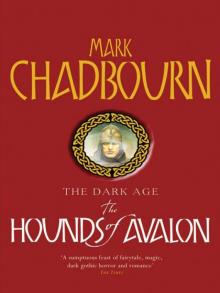 The Hounds of Avalon tda-3
The Hounds of Avalon tda-3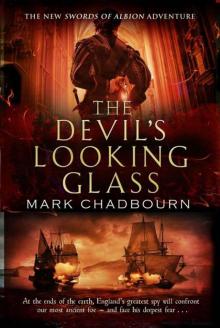 The Devil's Looking-Glass soa-3
The Devil's Looking-Glass soa-3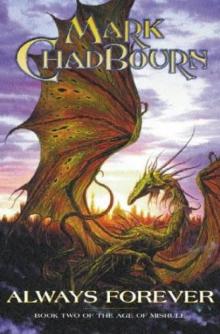 Always Forever taom-3
Always Forever taom-3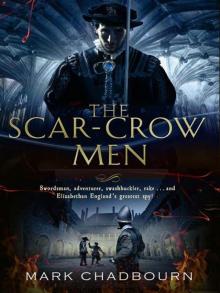 The Scar-Crow Men
The Scar-Crow Men Destroyer of Worlds kots-3
Destroyer of Worlds kots-3 Jack of Ravens kots-1
Jack of Ravens kots-1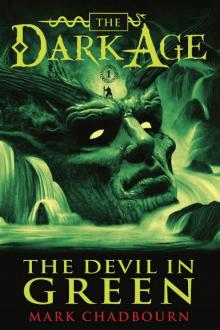 The Devil in Green
The Devil in Green World's End
World's End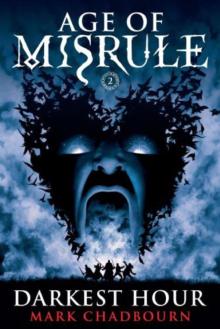 Darkest Hour (Age of Misrule, Book 2)
Darkest Hour (Age of Misrule, Book 2) Destroyer of Worlds
Destroyer of Worlds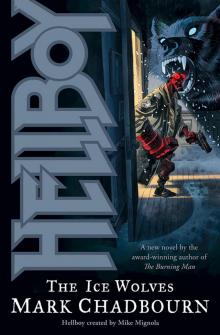 The Ice Wolves
The Ice Wolves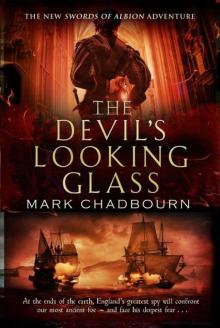 The Devil soa-3
The Devil soa-3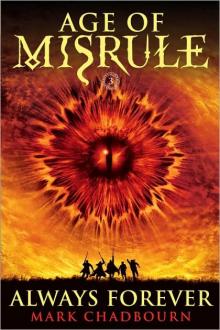 Always Forever
Always Forever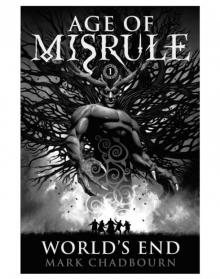 World's End (Age of Misrule, Book 1)
World's End (Age of Misrule, Book 1)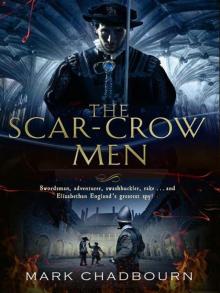 The Scar-Crow Men soa-2
The Scar-Crow Men soa-2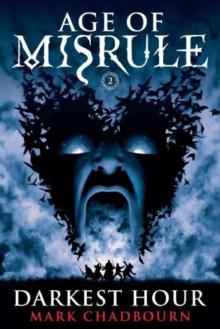 Darkest hour aom-2
Darkest hour aom-2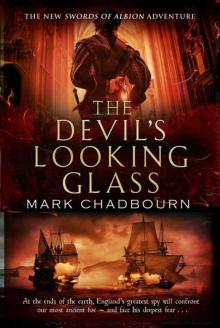 The Devil's Looking-Glass
The Devil's Looking-Glass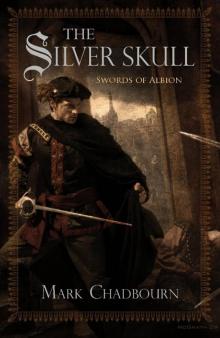 The Silver Skull
The Silver Skull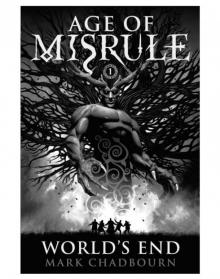 World's end taom-1
World's end taom-1 Jack of Ravens
Jack of Ravens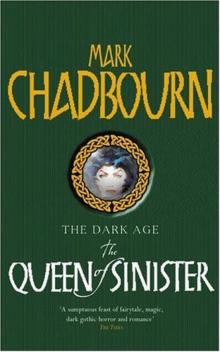 The Queen of Sinister
The Queen of Sinister